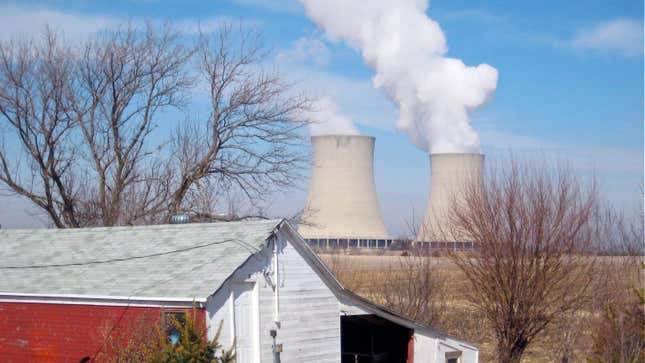
Illinois passed one of the most aggressive clean energy bills in the country on Monday, in a rousing success for environmental advocates that, unusually, also bails out some of the state’s biggest sources of clean power: nuclear energy.
The bill, known as the Climate and Equitable Jobs Act, passed the Senate on Monday in a 37-17 vote, and heads to Illinois Gov. JB Pritzker’s desk for signing. Pritzker tweeted his praise for the bill Monday and said he “look[ed] forward to signing into law.” In his statement on the bill’s passage, Joe Duffy, the executive director of Climate Jobs Illinois, a coalition of labor organizations that advocated for the bill, called it “the most pro-worker, pro-climate legislation in the country.”
The huge (nearly 1,000-page) bill reads like a wish list for a lot of the modern environmental movement. It mandates the closure of coal and natural gas plants by 2045, with closer dates for fossil fuel plants located in underserved communities. The bill also earmarks $580 million each year to build out wind and solar, including greatly increased funding for community solar, with the goal of increasing the state’s renewable energy standard to 40% by 2030 and 50% by 2040. The bill also includes funding for training programs to increase opportunities for BIPOC people in renewable energy industries, expands energy efficiency and weatherization programs in low-income communities, and mandates new labor standards across the clean energy industry.
Importantly—and unusually for a bill cheered by green groups—the bill also contains a huge bailout for the state’s nuclear industry. It earmarks nearly $700 million in subsidies to prevent the closure of the Byron and Dresden Generating Stations, two of six nuclear plants in the state. Doing so will extend their lifelines by another 5 years. Exelon, the plants’ owners and one of the biggest utilities in the country, had set a deadline of Sept. 13—the day the Climate and Equitable Jobs Act was passed—as the day they’d need to start closing Byron without some help from the state. Doing so would have taken one of the biggest nuclear plants in the country offline. A report from nuclear advocates estimates that Illinois’s six nuclear plants currently provide 90% of the state’s clean power. Some analyses have shown that the plants’ closure would spur coal and gas plants to run more frequently to keep the grid operational, in addition to affecting the thousands of workers at the plants.
Nuclear is, on paper, a promising source of emissions-free energy: Some climate scientists like James Hansen have stressed the need for ratcheting up nuclear power in order to transition the world off fossil fuels and stave off the worst impacts of climate change. But thanks to public skepticism of its safety and skyrocketing prices for technology, the industry has landed on hard times.
As a result, the remaining nuclear plants on the grid in the U.S. have turned into kind of energy hot potatoes, a source of complex conversations around jobs, clean energy, and energy prices that don’t often fall along clear political lines. In Ohio, a scheme to bail out that state’s nuclear industry became tied to the fate of coal plants. Some of the Republicans who pushed the package were later brought down on bribery charges for taking money from FirstEnergy, the utility that owned the nuclear plants in question.
Meanwhile, many green groups cheered the closure of the Indian Point Generating Station in New York earlier this year. They pointed to promising sources of renewables to reduce the state’s emissions, despite the fact that the plant’s closure deprived the region of its single largest source of carbon-free energy and some estimates that emissions could rise temporarily while new renewables come online.
The Illinois bill, on the other hand, clearly ties the nuclear bailouts to new provisions for clean jobs and environmental justice. Green groups like Natural Resources Defense Council and the Sierra Club have both supported the closure of nuclear plants in the past, and the Sierra Club has spoken out against subsidies for nuclear in Illinois. But both groups have cheered the passage of this new bill.
The success in Illinois doesn’t mean nuclear is suddenly on the table for green groups, however. “Illinois needs to transition away from dirty fossil fuels as quickly as possible to fight the climate crisis,” JC Kibbey, a clean energy advocate for NRDC in Illinois, said in an email. “Longer-term, we will transition away from nuclear because wind and solar provide a cheaper, safer and more reliable source of energy. That’s what we’re doing in Illinois. We’re making a roadmap for an orderly transition to a clean energy future.”